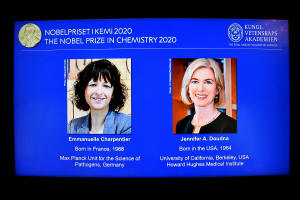Women creators of genetic 'scissors' win Nobel Prize in Chemistry
 Send a link to a friend
Send a link to a friend
 [October 07, 2020]
By Niklas Pollard and Douglas Busvine [October 07, 2020]
By Niklas Pollard and Douglas Busvine
STOCKHOLM/BERLIN (Reuters) - Two women
scientists won the 2020 Nobel Prize in Chemistry on Wednesday for
creating genetic 'scissors' that can rewrite the code of life,
contributing to new cancer therapies and holding out the prospect of
curing hereditary diseases.
Emmanuelle Charpentier, who is French, and American Jennifer Doudna
share the 10 million Swedish crown ($1.1 million) prize for developing
the CRISPR/Cas9 tool to edit the DNA of animals, plants and
microorganisms with precision.
"The ability to cut the DNA where you want has revolutionized the life
sciences," Pernilla Wittung Stafshede of the Swedish Academy of Sciences
told an award ceremony.
Charpentier, 51, and Doudna, 56, become the sixth and seventh women to
win a Nobel for chemistry, joining Marie Curie, who won in 1911, and
more recently, Frances Arnold, in 2018.
It is the first time since 1964, when Britain's Dorothy Crowfoot Hodgkin
alone won the award, that no men are among the winners of the chemistry
prize.
Charpentier, of the Max Planck Institute for the Science of Pathogens in
Berlin, said she was "very emotional" after getting a call from
Stockholm with the news.
"When it happens you are very surprised, and you feel that it is not
real," she said. "But obviously it is real so I have to get used to it
now."

CONTROVERSIAL FIELD
The path from discovery to prize has taken less than a decade - a
relatively short period by Nobel standards.
And, although CRISPR had been widely tipped to win the Chemistry prize,
there has also been concern about possible misuse of the technology, for
example to create made-to-order 'designer babies'.
"The enormous power of this technology means that we need to use it with
great care," said Claes Gustafsson, chair of the Nobel Committee for
Chemistry.
"But it is equally clear that this is a technology, a method that will
provide humankind with great opportunities."
CRISPR is a crowded field, with multiple claims on discovery leading to
fierce patent disputes. Gustafsson deflected a question on whether the
prize committee had considered other contenders for the award.
[to top of second column]
|

Pictures of Emmanuelle Charpentier and Jennifer A. Doudna, winners
of the 2020 Nobel Prize in Chemistry, are displayed on a screen
during the news conference announcing the laureates, at the Royal
Swedish Academy of Sciences, in Stockholm, Sweden, October 7, 2020.
are the laureates, . TT News Agency/Henrik Montgomery/Pool via
REUTERS

ANCIENT BACTERIA
Charpentier's breakthrough came in the study of ancient bacteria,
Streptococcus pyogenes, when she found that a previously unknown
molecule was part of its immune system and was capable of 'cleaving'
DNA.
She published her findings in 2011 and, in that year, joined forces
with biochemist Doudna, of the University of California, Berkeley,
to recreate the bacteria's genetic scissors in a test tube.
DNA is a string with up to 6 billion coded instructions that tell a
cell what to do. The beauty of CRISPR/Cas9 is that it can not only
snip DNA at the right spot, but also repair the join so that errors
do not creep in.
Today CRISPR/Cas9 is a common tool in biochemistry and molecular
biology labs - used in plant treatments and to develop novel
treatments of hereditary human diseases such as sickle-cell anaemia.
"We can now easily edit genomes as desired, something that before
was hard, even impossible," said Wittung Stafshede.
In keeping with tradition, chemistry is the third prize announced
every year and follows those for medicine and physics earlier this
week.
The prizes for achievements in science, literature and peace were
created and funded in the will of Swedish dynamite inventor and
businessman Alfred Nobel and have been awarded since 1901, with the
economics award a later addition.
Like so much else, the pandemic has redrawn the Nobels, with many of
the traditional events, such as the grand banquet, cancelled or
moved online even as research into the disease - above all the hunt
for a vaccine - has dominated the scientific spotlight.
(Reporting by Niklas Pollard; additional reporting Simon Johnson,
Anna Ringstrom, Supantha Mukherjee, Colm Fulton and Johannes
Hellstrom; Editing by Alison Williams and Giles Elgood)
[© 2020 Thomson Reuters. All rights
reserved.] Copyright 2020 Reuters. All rights reserved. This material may not be published,
broadcast, rewritten or redistributed.
Thompson Reuters is solely responsible for this content. |